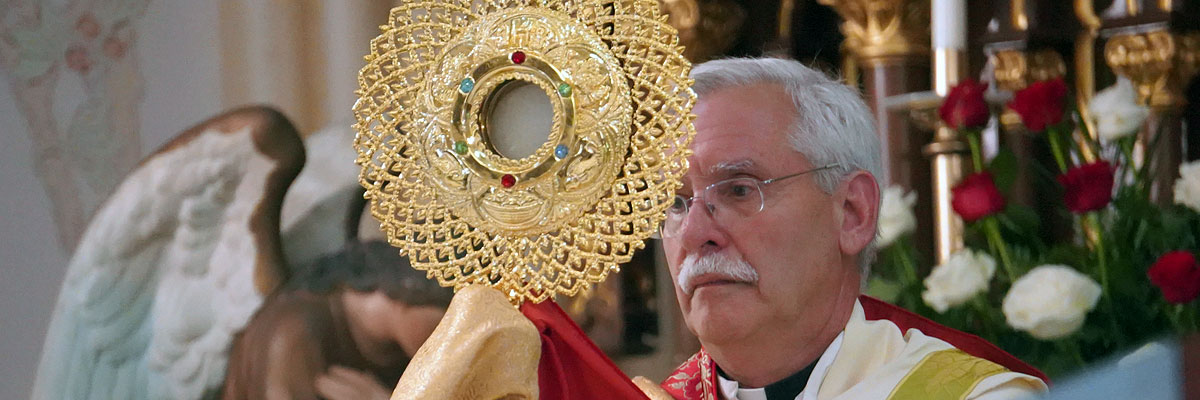Official Website of the
Catholic Diocese of Little Rock
Joseph rises to privilege and forgiveness
Published: August 13, 2011
This is the third column in a 13-part series
By Cackie Upchurch
Director of Little Rock Scripture Study
The story of Joseph in the book of Genesis has all the elements that would make a good television mini-series or three-part movie for the silver screen.
 Episode one would focus on the sibling rivalry among brothers, sharpened by rivalry among Jacob's wives (29:31–30:22), and the perceived preferential treatment by an elderly father (37:1-4). It is easy to imagine the character development that could dominate this installment.
Episode one would focus on the sibling rivalry among brothers, sharpened by rivalry among Jacob's wives (29:31–30:22), and the perceived preferential treatment by an elderly father (37:1-4). It is easy to imagine the character development that could dominate this installment.
Episode two would take us into the cistern where the youngest son Joseph is hidden away until he can be sold into slavery by his brothers (37:5-36). The envy that led to diabolical plans to get rid of their brother also led to a deep grief within their large family. And for Joseph, there were times of testing (ch. 39).
The third and final episode would focus in on the reversal of fortunes, famine and despair by the family living in Canaan, and unexpected abundance and access to power for Joseph, now serving in the courts of Pharaoh (chs. 40–48).
This is a story with great entertainment value. And no one could doubt that traits such as envy, jealousy and despair could hook an audience in almost any generation. But what insights can we uncover for our spiritual journeys by digging a little more deeply into the biblical account?
Joseph is a dreamer and interpreter of dreams (37:5-11; 40:5–41:32). In the world of biblical times, dreams were taken very seriously as an avenue of communication from and with God. Two of his dreams as a young man indicated that others, even his older family members, would one day bow before him. Joseph not only has an intimate relationship with God, but he is willing both to see as God sees and to speak about what he sees.
On the one hand, this gift is what puts him at odds with his brothers who resented the image of their humility before him, and on the other hand, it puts him in good standing with Pharaoh, a status that in the end will benefit his entire family.
What could be read as a position of privilege — being allowed to stay home while his older brothers drove the herds, interpreting dreams while they were feeding and shearing sheep — actually serves a divine purpose for the future of his family and all of God's people.
When his father Jacob told Joseph to go to his brothers in Shechem, Joseph doesn't protest, but responds just as others throughout salvation history responded to God. The Hebrew term is "hinneni," translated as "I am ready," or "here I am." Consider Moses who took off his sandals before the burning bush and answered "Here I am" (Exod 3:4), or the young Samuel who repeatedly said the same when he thought Eli was calling him and it was really God (1 Sam 3), or Isaiah who responded to God, "Here I am, send me" (Isa 6:8).
Joseph's attitude of willing service, and his ability to interpret dreams, puts him in good stead with Pharaoh when he enters the royal household as a slave. It allows him to rise in the ranks and over a period of years gain positions of authority that test the logic of modern readers. But it is his humility and forgiving heart that allows him to do what some would think impossible: forgive his brothers for their earlier crimes against him, and offer them shelter when Canaan enters a time of famine (Genesis 42-45).
When Joseph finally reveals himself to his starving brothers, he identifies plainly the wrong they did to him: "I am your brother Joseph, whom you sold into Egypt" (45:4). But he does not allow his words to hang in the air long, causing guilt and shame. Instead, he sees as God sees, and once again becomes an interpreter of events. "But now do not be distressed, and do not be angry with yourselves for having sold me here … God sent me on ahead of you to ensure for you a remnant on earth and to save your lives in an extraordinary deliverance. So it was not really you but God who had me come here" (45:5, 7-8a).
When we respond to God's promptings in our lives, we cannot know where it will lead, but like Joseph, we can make ourselves available and ask for the gift to see God's hand, and offer God's healing.
Study Questions
- What attracts you initially to the stories of Israel's patriarchs and matriarchs?
- In what ways do you make yourself available for God to direct you and help you to see as God sees?
- What signs of God's presence can you identify in the interactions of Jacob's family?
- Like Joseph, what past trouble or hurt would you like to have resolved in forgiveness?
This article was originally published in Arkansas Catholic Aug. 13, 2011. Copyright Diocese of Little Rock. All rights reserved. This article may be copied or redistributed with acknowledgement and permission of the publisher.









